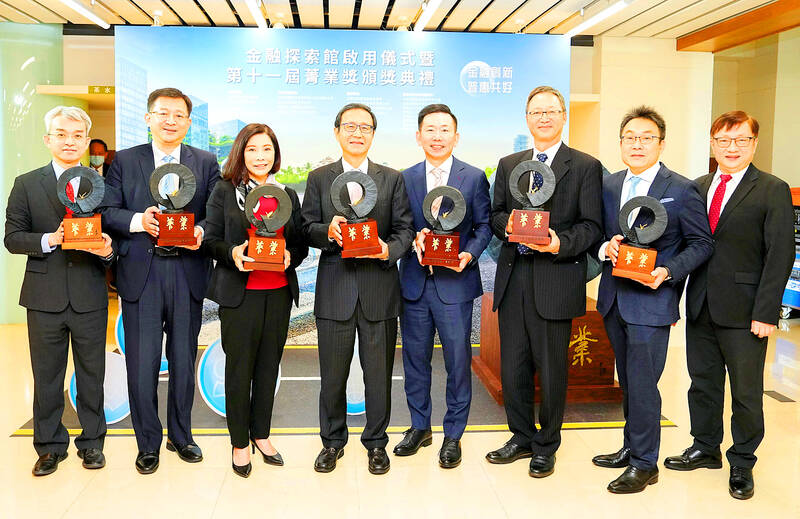CTBC Financial Holding Co (中信金控) and CTBC Bank Co (中信銀行) on Friday won seven awards at the Taiwan Banking and Finance Elite Awards ceremony in recognition of their efforts in innovating financial products and services, setting a record by winning in all of the categories they competed in.
This is another great honor CTBC has received this year after winning more than 280 awards at home and abroad, along with more than 110 patents approved, showing that CTBC not only has excellent business performance, but also strives to give back to society.
Organized by the Taiwan Academy of Banking and Finance, the biennial Elite Awards are widely regarded as the financial industry’s Oscars in Taiwan.

Photo courtesy of CTBC Bank Co
A total of 129 projects from 53 financial institutions entered this year’s competition, which went through rounds of reviews and examinations before the winners were selected.
In this year’s 11th Elite Awards ceremony, CTBC Bank was presented with “Best Green Finance Award,” “Best Wealth Management Award,” “Best Institution Trust Finance Award,” “Best Digital Banking Award” and “Best Risk Management Award.”
In addition, CTBC Bank also won “Excellence Award in Consumer Banking,” while CTBC Financial was presented with “Excellence Award in Environmental, Social and Governance” in the general finance category.
The organizer said that CTBC has moved from being a product-oriented company to a client-oriented one, and has continued to launch digital financial services that take into account convenience and agile security transaction controls.
The results have been outstanding, and CTBC is the biggest winner of this year’s Elite Awards, the organizer said.
In response to digital needs and climate change risks in the post-pandemic era, CTBC makes good use of technology and data, combined with sustainable goals, to significantly improve the effectiveness and efficiency of risk management, the organizer said.
The company also follows market trends to seek innovation and change, works to safeguard shareholders’ interests, fulfills corporate social responsibilities and offers a full range of professional trust services with outstanding results, it said.
The Elite Awards recognize the most outstanding financial institutions in Taiwan, CTBC Financial president James Chen (陳佳文) said.
As CTBC set a record by winning seven major awards this year, Chen thanked the event’s organizer and said the accolade has proven CTBC’s leading position in the nation’s financial industry.
Chen said that winning the awards was in line with the company’s core business development, from retail banking, trust business, digital finance, risk management to green financing, in compliance with government policies, as well as environmental, social and governance concepts.
Chen said CTBC approved relief loans to 280,000 people during the COVID-19 pandemic through its digital financial services, which helped contribute to social stability.
In the high-asset business promoted by the government to attract returning capital from abroad, CTBC has also achieved a leading position in the market.
The company is also a member of the “Coalition of Movers and Shakers on Sustainable Finance,” which was established on Sept. 5 to set standards of best practices for net zero transformation.

Taiwan Semiconductor Manufacturing Co (TSMC, 台積電) secured a record 70.2 percent share of the global foundry business in the second quarter, up from 67.6 percent the previous quarter, and continued widening its lead over second-placed Samsung Electronics Co, TrendForce Corp (集邦科技) said on Monday. TSMC posted US$30.24 billion in sales in the April-to-June period, up 18.5 percent from the previous quarter, driven by major smartphone customers entering their ramp-up cycle and robust demand for artificial intelligence chips, laptops and PCs, which boosted wafer shipments and average selling prices, TrendForce said in a report. Samsung’s sales also grew in the second quarter, up

On Tuesday, US President Donald Trump weighed in on a pressing national issue: The rebranding of a restaurant chain. Last week, Cracker Barrel, a Tennessee company whose nationwide locations lean heavily on a cozy, old-timey aesthetic — “rocking chairs on the porch, a warm fire in the hearth, peg games on the table” — announced it was updating its logo. Uncle Herschel, the man who once appeared next to the letters with a barrel, was gone. It sparked ire on the right, with Donald Trump Jr leading a charge against the rebranding: “WTF is wrong with Cracker Barrel?!” Later, Trump Sr weighed

HEADWINDS: Upfront investment is unavoidable in the merger, but cost savings would materialize over time, TS Financial Holding Co president Welch Lin said TS Financial Holding Co (台新新光金控) said it would take about two years before the benefits of its merger with Shin Kong Financial Holding Co (新光金控) become evident, as the group prioritizes the consolidation of its major subsidiaries. “The group’s priority is to complete the consolidation of different subsidiaries,” Welch Lin (林維俊), president of the nation’s fourth-largest financial conglomerate by assets, told reporters during its first earnings briefing since the merger took effect on July 24. The asset management units are scheduled to merge in November, followed by life insurance in January next year and securities operations in April, Lin said. Banking integration,

LOOPHOLES: The move is to end a break that was aiding foreign producers without any similar benefit for US manufacturers, the US Department of Commerce said US President Donald Trump’s administration would make it harder for Samsung Electronics Co and SK Hynix Inc to ship critical equipment to their chipmaking operations in China, dealing a potential blow to the companies’ production in the world’s largest semiconductor market. The US Department of Commerce in a notice published on Friday said that it was revoking waivers for Samsung and SK Hynix to use US technologies in their Chinese operations. The companies had been operating in China under regulations that allow them to import chipmaking equipment without applying for a new license each time. The move would revise what is known